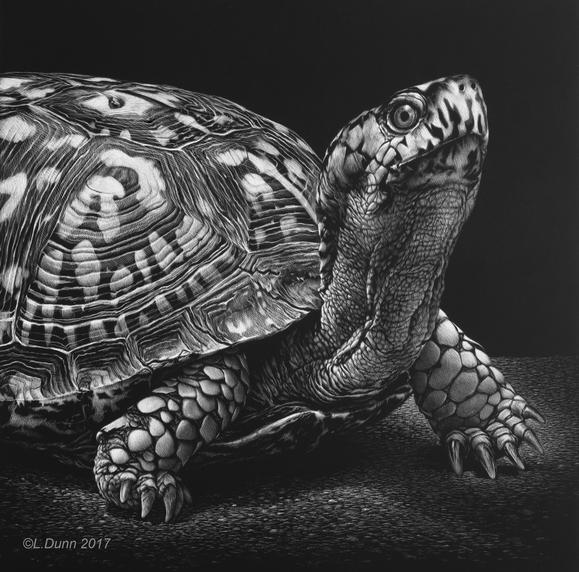LORI DUNN SCRATCHBOARD ART
promoting conservation through artistic efforts
Slow But Steady
8 x 8
SOLD
It looks like a tortoise, but it's not! The Eastern box turtle (Terrapene carolina carolina) is actually a member of the pond turtle family but is highly terrestrial in its habits. They have a hinged plastron unlike other species of pond turtles, allowing them to completely enclose or "box" themselves inside their shell. A subspecies of the common box turtle, the eastern box turtle is found throughout the eastern US from Maine to Florida, as well as the north central area of the country. They prefer to inhabit deciduous forested areas with good drainage, and are considered to be opportunistic omnivores - feeding on a variety of insects, animal matter and plant matter including fungi and berries.
Recent research indicates that box turtle populations are in trouble, and their status was changed to "Vulnerable" through the IUCN. Like many turtle species, they do everything slowly and deliberately, including reproduction. In this age of rapid habitat loss, climate change and an increase in road mortality, this spells disaster for the turtle. Many turtle species, including the box turtle do not reach sexual maturity for 8 to 10 years, and females only lay 2-8 eggs which take a couple of months to hatch. The likelihood of any surviving is slim even without this pressure. Predation of eggs by small mammals whose populations are increasing due to the lack of their own natural predators, is also a factor. As if all of this was not bad enough, another, more serious, threat faces all North American turtles - poaching.
Poaching of wild turtles for both the pet trade and also the Asian market has been an ongoing concern for many years. Even wild box turtles are still legally allowed to be collected and sold in a few states. Pressure is mounting to make this an unlawful practice. Asian cultures believe that eating turtle meat gives them longevity. Most, if not all, of Southeast Asia's turtles, about 65 species, are now facing extinction. The Asian turtle crisis has been one of the most rapid mass eradication of reptiles in our lifetime. Their loss will mean further pressure on North American species as they are smuggled overseas.
I'd like to think that the popularity of the box turtle will help to ensure their existence. I can't imagine even the staunchest of reptile haters not having their pants charmed off by these enigmatic and delightful creatures. All I can do is present this artwork to you, in the manner I have chosen, and hope you'll help take action. Share your love of all creatures with those you know, and help preserve habitat. A helping hand for those individuals trying to cross roads is also hugely important. For more information on the crises facing turtles and tortoises you can visit these links below. I'd like to thank fellow artist and friend Tim Donovan, an avid box turtle lover, for generously allowing me to peruse some of his photos for use as reference for this piece.
www.turtlesurvival.org
www.ttpg.org
